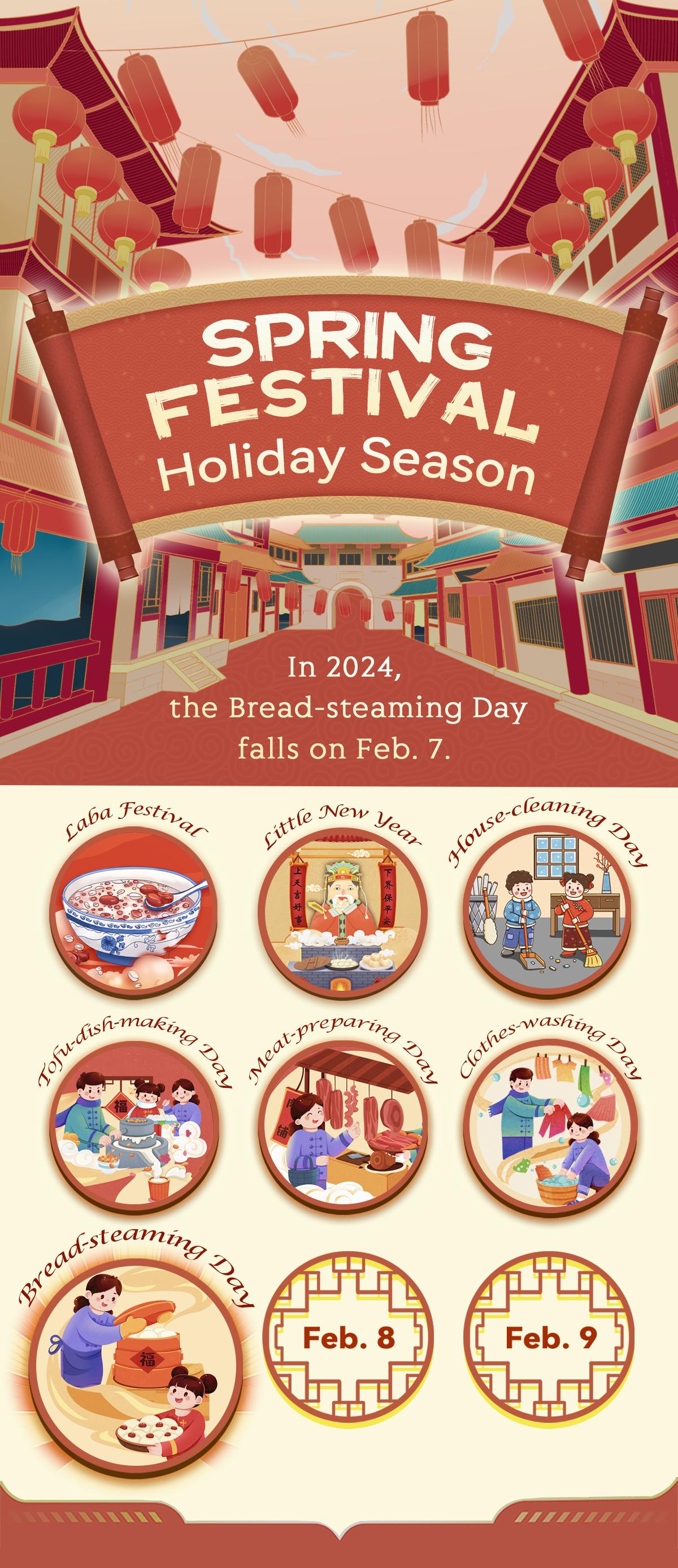Editor's note:
The Lunar New Year, or Spring Festival, has been officially listed as a U.N. floating holiday as of 2024. This year, it falls on Feb. 10. To enjoy a traditional and fascinating Spring Festival, the most important festival for Chinese people, here are 16 days with unique traditions you won't want to miss this holiday season.
Day 7, Bread-steaming Day (Feb. 7, 2024)

The Bread-steaming Day is on the 28th day of the 12th lunar month, three days before Spring Festival. This year, it falls on Feb. 7. Steamed bread was a must-have on this day in the past, serving as both a staple food and an offering for deities and ancestors.
In northern China, families usually make a large batch of steamed buns, freeze most of them, and eat the rest during Spring Festival when meeting with friends and family. The small dough balls on the steamer grow bigger and rounder, symbolizing wealth and auspiciousness. At the same time, the steam curling up in the pot also represents the auspicious meaning of "flourishing day by day."
Day 6, Clothes-washing Day (Feb. 6, 2024)
The Clothes-washing Day is on the 27th day of the 12th lunar month, four days before Spring Festival. This year, it falls on Feb. 6. People usually wash clothes, bedsheets, curtains and the like on this day. These activities symbolize washing away all the bad luck of the past year and welcoming in happiness and good luck for the coming year.
Day 5, Meat-preparing Day (Feb. 5, 2024)
The Meat-preparing Day is on the 26th day of the 12th lunar month, five days before Spring Festival. From this day, dishes for the sumptuous New Year's Eve feast are prepared in succession.
In the past when food was scarce, poor families could only eat meat during Spring Festival. This evolved into a custom of either slaughtering livestock raised the past year, or buying meat at a street market or supermarket on the day. In 2024, the Meat-preparing Day falls on Feb. 5.
Day 4, Tofu-dish-making Day (Feb. 4, 2024)
Many families like to make tofu or tofu dishes on the 25th day of the 12th lunar month, six days before Spring Festival. The origin for this tradition comes from the "fu" in the word "tofu" having the same pronunciation as the Chinese character "福," which means blessings and happiness.
Chinese people have a strong affection for auspiciousness during Spring Festival, so the pursuit of good luck is a constant theme throughout both the 12th and first lunar months of the year. In 2024, the Tofu-dish-making Day falls on Feb. 4.
Day 3, House-cleaning Day (Feb. 3, 2024)
Families traditionally clean their homes on the 24th day of the 12th lunar month, seven days before Spring Festival, in preparation for the Lunar New Year. In 2024, the House-cleaning Day falls on Feb. 3.
In the past, families would sweep the courtyard, clean household appliances, wash bedclothes and dredge the farm ditches on this day. The tradition of thoroughly cleaning one's house carries the meaning of dispelling diseases and praying for good health in the coming year.
Day 2, Little New Year (Feb. 2 or 3, 2024)
Little New Year, regarded as the prologue to Spring Festival, is celebrated on the 23rd day of the 12th lunar month in North China and on the 24th day of the same month in South China, eight or seven days before Spring Festival. In 2024, it falls on Feb. 2 and Feb. 3, respectively.
This day is also known as the Festival of the Kitchen God and families usually make offerings to the deity on the day. It is said that the Kitchen God returns to heaven on this day to submit his annual report to the Jade Emperor (the supreme deity of Taoism). Therefore, families offer sticky sweets to him in order to sweeten his tongue so that he only reports good things. Family members, especially children, also enjoy more sweets on this day.
Day 1, Laba Festival (Jan. 18, 2024)
Traditionally, Spring Festival countdown preparations begin on Laba Festival, the eighth day of the 12th lunar month, the last month of a lunar year. In 2024, it falls on Jan. 18.
Laba Festival was originally held to mark the Buddha's enlightenment and has since evolved into a popular folk festival. Eating Laba porridge on this day is an established tradition, as the porridge symbolizes good fortune, long life and a fruitful harvest.
The specialty is usually made with at least eight ingredients; therefore, it is also called eight-treasure porridge. Filled with cereals, beans, nuts and dried fruits, today's Laba porridge is both tasty and nourishing. Local festive food also includes Laba wine, Laba noodle soup, garlic pickled in vinegar and pickled Chinese cabbage.

